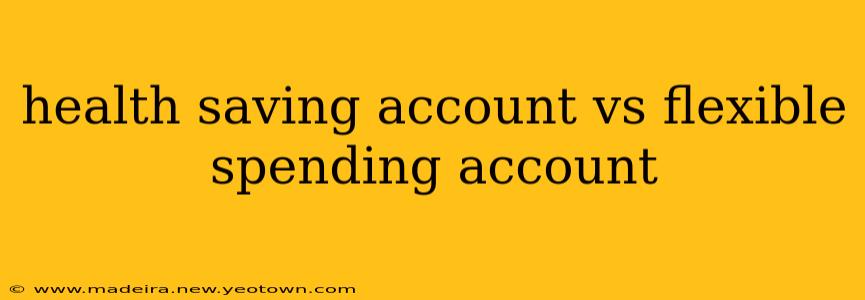Choosing between a Health Savings Account (HSA) and a Flexible Spending Account (FSA) can feel like navigating a medical maze. Both offer tax advantages for healthcare expenses, but their structures and benefits differ significantly. Let's unravel the mystery, starting with a compelling story.
Imagine Sarah, a young professional with a high-deductible health plan. She's diligently saving for future medical costs and wants a tax-advantaged way to do so. Then there's Mark, an older individual with a traditional health plan, who needs to manage his healthcare expenses more immediately. Their needs highlight the key differences between HSAs and FSAs. Sarah might find an HSA more beneficial, while Mark might prefer an FSA. Let's delve into the specifics to understand why.
What is a Health Savings Account (HSA)?
An HSA is like a personal savings account specifically for healthcare expenses. You contribute pre-tax dollars, and the money grows tax-free. Think of it as your own personal healthcare piggy bank. The catch? You must be enrolled in a high-deductible health plan (HDHP) to qualify for an HSA.
Key Features of an HSA:
- Triple Tax Advantage: Contributions are tax-deductible, earnings grow tax-free, and withdrawals for qualified medical expenses are tax-free.
- Ownership: The money in your HSA is yours, even if you change jobs or insurance plans. It's your money, to keep and grow over time.
- Rollover: Unused funds roll over year to year, unlike FSAs. This allows for long-term savings and planning for future healthcare costs.
- Investment Options: Many HSAs offer investment options, allowing your money to grow beyond simple interest.
Can I use an HSA for non-medical expenses?
Yes, but there's a catch. You can withdraw money from your HSA for non-qualified expenses but will be subject to income tax plus a 20% additional tax penalty. Therefore, only use it for non-qualified expenses if absolutely necessary.
What is a Flexible Spending Account (FSA)?
An FSA is more of a short-term, employer-sponsored plan. You contribute pre-tax dollars each year, and those funds are used to pay for eligible healthcare expenses within that plan year.
Key Features of an FSA:
- Tax Advantages: Your contributions are made pre-tax, reducing your taxable income.
- Employer Match: Some employers offer matching contributions to incentivize participation.
- Use-It-or-Lose-It: This is a major drawback. Any unused funds at the end of the plan year are typically forfeited. Some plans offer a grace period or a limited carryover, but these are not always available.
- Limited to Employment: Your FSA is tied to your employer. If you change jobs, you generally lose any remaining funds.
What are the different types of FSAs?
There are primarily two types of FSAs:
- Healthcare FSA: Covers medical expenses like doctor visits, prescriptions, and dental care.
- Dependent Care FSA: Covers expenses for the care of qualifying dependents (children under age 13) to allow you to work or look for work.
HSA vs. FSA: A Side-by-Side Comparison
| Feature | HSA | FSA |
|---|---|---|
| Plan Required | High-Deductible Health Plan (HDHP) | Any health insurance plan |
| Ownership | You own the funds | Employer-sponsored; funds forfeited if unused |
| Rollover | Yes, funds roll over year to year | Generally no; limited exceptions may apply |
| Contribution Limits | Annual limits set by the government | Annual limits set by the employer |
| Investment Options | Often available | Typically not available |
| Tax Advantages | Triple tax advantage | Pre-tax contributions |
Which is right for me?
The "best" account depends entirely on your individual circumstances and healthcare needs.
-
Choose an HSA if: You're healthy, have a high-deductible health plan, and want to save for long-term healthcare costs. You're comfortable with higher upfront costs in exchange for the long-term benefits and tax advantages.
-
Choose an FSA if: You anticipate significant healthcare expenses within the plan year and need immediate assistance with medical costs. You’re comfortable with the “use-it-or-lose-it” nature of the plan.
Remember, consult with a financial advisor or healthcare professional for personalized guidance. They can help you assess your specific needs and determine the best option for managing your healthcare expenses.

